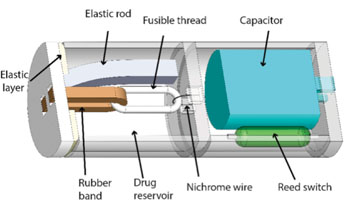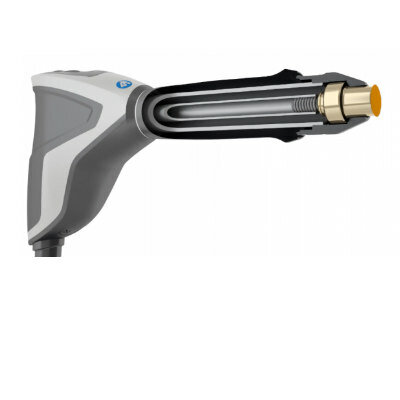Smart Capsule Delivers Payload to Large Intestines
|
By HospiMedica International staff writers Posted on 15 Sep 2015 |

Image: The smart drug delivery capsule (Photo courtesy of Babak Ziaie/Purdue University).
An innovative drug delivery capsule could deliver drugs directly to the gastrointestinal (GI) tract to target certain medical conditions.
Developed by researchers at Purdue University (West Lafayette, IN, USA), the 9×26 mm capsule is comprised of two compartments; one contains a charged capacitor and a reed switch, while the second one houses the drug reservoir, capped by a taut nylon thread intertwined with a nichrome wire connected to the capacitor through the reed switch. The capsule meanders through the intestines until it reaches the target location within the GI tract, which is marked by an implanted miniature magnetic marker or an externally-worn larger magnet.
The proximity to the magnet activates the reed switch, which discharges the capacitor into the nichrome wire, melting the nylon thread. This releases a spring-loaded mechanism that opens the capped capsule to deliver the medication. A prototype capsule, about the same size as a standard gelatin capsule, was designed to release its powdered payload just before reaching the ileocecal valve, the meeting point of small and large intestines. A study describing the capsule was published in the September 2015 issue of IEEE Transactions on Biomedical Engineering.
“Usually, when you take medication it is absorbed in the stomach and small intestine before making it to the large intestine; however, there are many medications that you would like to deliver specifically to the large intestine, and a smart capsule is an ideal targeted-delivery vehicle for this,” said senior author, Professor of electrical and computer engineering Babak Ziaie, PhD. “People are sometimes treated for C. difficile by transplanting feces from another person into the patient's large intestine, which provides vital microbes. However, it might be possible to convert the microbes into a powder through freeze-drying and deliver them with smart capsules instead.”
Related Links:
Purdue University
Developed by researchers at Purdue University (West Lafayette, IN, USA), the 9×26 mm capsule is comprised of two compartments; one contains a charged capacitor and a reed switch, while the second one houses the drug reservoir, capped by a taut nylon thread intertwined with a nichrome wire connected to the capacitor through the reed switch. The capsule meanders through the intestines until it reaches the target location within the GI tract, which is marked by an implanted miniature magnetic marker or an externally-worn larger magnet.
The proximity to the magnet activates the reed switch, which discharges the capacitor into the nichrome wire, melting the nylon thread. This releases a spring-loaded mechanism that opens the capped capsule to deliver the medication. A prototype capsule, about the same size as a standard gelatin capsule, was designed to release its powdered payload just before reaching the ileocecal valve, the meeting point of small and large intestines. A study describing the capsule was published in the September 2015 issue of IEEE Transactions on Biomedical Engineering.
“Usually, when you take medication it is absorbed in the stomach and small intestine before making it to the large intestine; however, there are many medications that you would like to deliver specifically to the large intestine, and a smart capsule is an ideal targeted-delivery vehicle for this,” said senior author, Professor of electrical and computer engineering Babak Ziaie, PhD. “People are sometimes treated for C. difficile by transplanting feces from another person into the patient's large intestine, which provides vital microbes. However, it might be possible to convert the microbes into a powder through freeze-drying and deliver them with smart capsules instead.”
Related Links:
Purdue University
Latest Critical Care News
- Powerful AI Risk Assessment Tool Predicts Outcomes in Heart Failure Patients
- Peptide-Based Hydrogels Repair Damaged Organs and Tissues On-The-Spot
- One-Hour Endoscopic Procedure Could Eliminate Need for Insulin for Type 2 Diabetes
- AI Can Prioritize Emergency Department Patients Requiring Urgent Treatment
- AI to Improve Diagnosis of Atrial Fibrillation
- Stretchable Microneedles to Help In Accurate Tracking of Abnormalities and Identifying Rapid Treatment
- Machine Learning Tool Identifies Rare, Undiagnosed Immune Disorders from Patient EHRs
- On-Skin Wearable Bioelectronic Device Paves Way for Intelligent Implants
- First-Of-Its-Kind Dissolvable Stent to Improve Outcomes for Patients with Severe PAD
- AI Brain-Age Estimation Technology Uses EEG Scans to Screen for Degenerative Diseases
- Wheeze-Counting Wearable Device Monitors Patient's Breathing In Real Time
- Wearable Multiplex Biosensors Could Revolutionize COPD Management
- New Low-Energy Defibrillation Method Controls Cardiac Arrhythmias
- New Machine Learning Models Help Predict Heart Disease Risk in Women
- Deep-Learning Model Predicts Arrhythmia 30 Minutes before Onset
- Breakthrough Technology Combines Detection and Treatment of Nerve-Related Disorders in Single Procedure
Channels
Artificial Intelligence
view channel
AI-Powered Algorithm to Revolutionize Detection of Atrial Fibrillation
Atrial fibrillation (AFib), a condition characterized by an irregular and often rapid heart rate, is linked to increased risks of stroke and heart failure. This is because the irregular heartbeat in AFib... Read more
AI Diagnostic Tool Accurately Detects Valvular Disorders Often Missed by Doctors
Doctors generally use stethoscopes to listen for the characteristic lub-dub sounds made by heart valves opening and closing. They also listen for less prominent sounds that indicate problems with these valves.... Read moreSurgical Techniques
view channel
Miniaturized Implantable Multi-Sensors Device to Monitor Vessels Health
Researchers have embarked on a project to develop a multi-sensing device that can be implanted into blood vessels like peripheral veins or arteries to monitor a range of bodily parameters and overall health status.... Read more
Tiny Robots Made Out Of Carbon Could Conduct Colonoscopy, Pelvic Exam or Blood Test
Researchers at the University of Alberta (Edmonton, AB, Canada) are developing cutting-edge robots so tiny that they are invisible to the naked eye but are capable of traveling through the human body to... Read more
Miniaturized Ultrasonic Scalpel Enables Faster and Safer Robotic-Assisted Surgery
Robot-assisted surgery (RAS) has gained significant popularity in recent years and is now extensively used across various surgical fields such as urology, gynecology, and cardiology. These surgeries, performed... Read morePatient Care
view channelFirst-Of-Its-Kind Portable Germicidal Light Technology Disinfects High-Touch Clinical Surfaces in Seconds
Reducing healthcare-acquired infections (HAIs) remains a pressing issue within global healthcare systems. In the United States alone, 1.7 million patients contract HAIs annually, leading to approximately... Read more
Surgical Capacity Optimization Solution Helps Hospitals Boost OR Utilization
An innovative solution has the capability to transform surgical capacity utilization by targeting the root cause of surgical block time inefficiencies. Fujitsu Limited’s (Tokyo, Japan) Surgical Capacity... Read more
Game-Changing Innovation in Surgical Instrument Sterilization Significantly Improves OR Throughput
A groundbreaking innovation enables hospitals to significantly improve instrument processing time and throughput in operating rooms (ORs) and sterile processing departments. Turbett Surgical, Inc.... Read moreHealth IT
view channel
Machine Learning Model Improves Mortality Risk Prediction for Cardiac Surgery Patients
Machine learning algorithms have been deployed to create predictive models in various medical fields, with some demonstrating improved outcomes compared to their standard-of-care counterparts.... Read more
Strategic Collaboration to Develop and Integrate Generative AI into Healthcare
Top industry experts have underscored the immediate requirement for healthcare systems and hospitals to respond to severe cost and margin pressures. Close to half of U.S. hospitals ended 2022 in the red... Read more
AI-Enabled Operating Rooms Solution Helps Hospitals Maximize Utilization and Unlock Capacity
For healthcare organizations, optimizing operating room (OR) utilization during prime time hours is a complex challenge. Surgeons and clinics face difficulties in finding available slots for booking cases,... Read more
AI Predicts Pancreatic Cancer Three Years before Diagnosis from Patients’ Medical Records
Screening for common cancers like breast, cervix, and prostate cancer relies on relatively simple and highly effective techniques, such as mammograms, Pap smears, and blood tests. These methods have revolutionized... Read morePoint of Care
view channel
Critical Bleeding Management System to Help Hospitals Further Standardize Viscoelastic Testing
Surgical procedures are often accompanied by significant blood loss and the subsequent high likelihood of the need for allogeneic blood transfusions. These transfusions, while critical, are linked to various... Read more
Point of Care HIV Test Enables Early Infection Diagnosis for Infants
Early diagnosis and initiation of treatment are crucial for the survival of infants infected with HIV (human immunodeficiency virus). Without treatment, approximately 50% of infants who acquire HIV during... Read more
Whole Blood Rapid Test Aids Assessment of Concussion at Patient's Bedside
In the United States annually, approximately five million individuals seek emergency department care for traumatic brain injuries (TBIs), yet over half of those suspecting a concussion may never get it checked.... Read more
New Generation Glucose Hospital Meter System Ensures Accurate, Interference-Free and Safe Use
A new generation glucose hospital meter system now comes with several features that make hospital glucose testing easier and more secure while continuing to offer accuracy, freedom from interference, and... Read moreBusiness
view channel
Johnson & Johnson Acquires Cardiovascular Medical Device Company Shockwave Medical
Johnson & Johnson (New Brunswick, N.J., USA) and Shockwave Medical (Santa Clara, CA, USA) have entered into a definitive agreement under which Johnson & Johnson will acquire all of Shockwave’s... Read more














